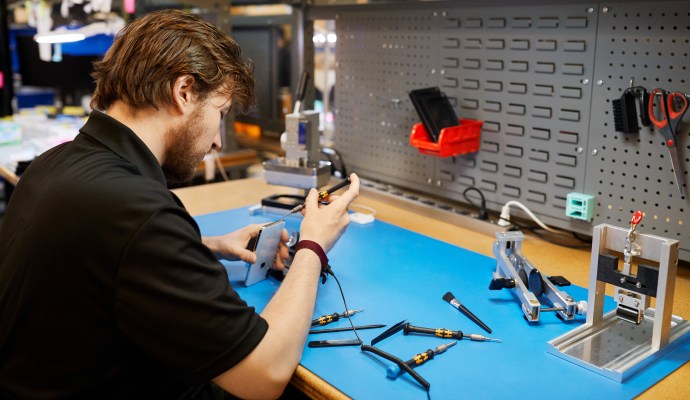This afternoon, the Biden White House convened a meeting of top executives and government officials to discuss growing calls to institute right to repair on a national level. The virtual meeting came two weeks after California Governor Gavin Newsom signed SB 244 into law, creating requirements for consumer electronics and appliance manufacturers to allow easier access to repair manuals and other resources.
Apple famously came out in favor of the California legislation, representing a shift for the company. Fittingly, it was present on today’s call, alongside individuals representing the farm equipment and automotive sectors. While SB 244 focused on mostly consumer electronics (with the exclusion of game consoles) and many appliances, it lacks farm and automotive provisions.
A Massachusetts ballot initiative, which passed three years earlier, included cars. A Minnesota law passed in May, meanwhile, ultimately made a carve-out for farming equipment, while Colorado’s version exclusively covers farm equipment and electric wheelchairs. New York’s version, meanwhile, was hit with a number of carve-outs on the way to Governor Kathy Hochul’s desk. The push to implement something at a federal level, however, could help standardize some of these issues.
“I’ve learned through the course of my experience that it’s best when we build a consumer protection ecosystem,” said director of the National Economic Council, Tom Perez, “a combination of federal actions, to the alphabet soup of regulators [FCC, FTC, et al.], state actions and local actions.”
FTC chair Lina Khan commented on the pushback many corporations have given such legislation. Device and automotive manufacturers have argued that putting such choice in the hands of consumers opens them up to additional security risks.
“We hear some manufacturers defend repair restrictions, claiming that they’re needed for safety or security reasons,” said Khan. “The FTC has found that all too often these claims are backed by limited evidence. Accordingly, the FTC has committed itself to using all of our enforcement and policy tools to fight for people’s right to repair their own products.”
Apple’s Vice President, Service and Operations Management, Brian Naumann, reiterated the need for data and security protections, while committing the company’s support to the passage of legislation at the federal level.
“We believe that a uniform federal repair law should do the following,” the executive said, “maintain privacy, data and device security features, which help to thwart theft; ensure transparency for consumers about the type of parts used in a repair; apply prospectively, to allow manufacturers to focus on building new products that can comply with the proposals; and, finally, create a strong national standard that benefits consumers across the U.S. and reduces the confusion created by potentially conflicting state approaches.”
The Apple representative also reiterated the importance of building more durable devices for “the ultimate goal, which is product longevity.” Many state and national politicians have latched onto the cause as a rare piece of legislation with real bipartisan support.
“We heard from a diverse coalition across Minnesota from all over our state, laying out the reasons why right repair was so important,” said Minnesota Attorney General Keith Ellison. “First, it’s good for business. We heard from a number of small business owners who are part of a device and equipment reuse sector that accounts for over 45,000 jobs in Minnesota. That’s a lot of jobs in Minnesota, giving them the tools that they need to better serve consumers helps strengthen a sector that generates $5 billion a year in Minnesota. Also, it’s good for the environment. We heard from county waste management agencies, recycling advocates who share the same message.”
